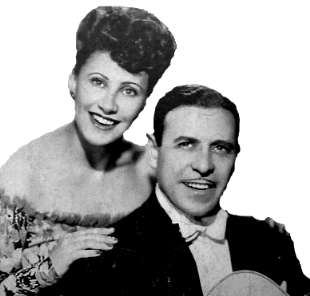
Yes, here and there, the blog's old links have withered. Some have been quietly replaced, but others, well, why leave it to chance that you'll ever find them?
Here's a re-up on "Siembamba," and this time, the live-in-concert version from the early 50's. The 50's was when a licensed professional brought recording equipment into a concert hall with permission, and the artists got paid.
"Siembamba" is sort of the South African version of "Rockabye Baby." We don't mind crooning to our kids about a baby hauled into a tree, and then falling to the ground when a limb breaks. Guaranteed, baby breaks a few limbs, too.
And so in South Africa, there was an equally charming old folk song called "Siembamba." The genteel, nearly forgotten husband and wife team of Marais and Miranda recorded it, along with such classics as "The Zulu Warrior" and "Marching to Pretoria." Today, folk singers are offering "Ducking from Pistorius," and "The Zulu Warrior signs with the Cleveland Cavaliers."
Goodwill ambassadors for South Africa during a naive age, fluent in songs involving both the conquering Dutch and the pissed off Africans, Marais and Miranda toured the world. They were sort of a European version of labelmates The Weavers, just two people short (or, two short people, as the album covers seem to suggest.) You can find most of their output fairly cheaply on eBay, or in one of the few record stores that is still in business.
South African Josef Marais (Nov 17 1905 - Apr 27 1978) and Amsterdam native Miranda (Rosa Lily Odette Baruch de la Pardo, Jan 9 1912 - Apr 20 1986) were kindly people. They used to sing a folk song about "Johnny with the Wooden Leg," but after the war, and mindful of injuries suffered by soldiers, they updated the lyric to "Johnny with the bandy leg." They dressed like classical concert artists, and almost never performed anything that could be considered tasteless. Almost never.
For any of you who are Dutch/South African, you'll recognize these lines:
Siembamba - mamma se kindjie. Siembamba - mamma se kindjie. Draai sy nek om gooi hom in die sloot. Trap op sy kop dan is hy dood.
"Die Sloot" doesn't have anything to do with wishing death on Joran Van Der Sloot, a walking promotion for abortion. Meanwhile, the download below includes the translation of the song and, especially for the early 50's, a slightly risque reference to what the politically correct now call "the B word."
With over-population a threat to kill us if global warming doesn't, here's...
The dead baby lullaby SIEMBAMBA.
2 comments:
The song originated in the second Anglo-Boer War, according to Nico Moolman who has done extensive research on the matter and has written several books on the topic.( Die Kamphoer, Ta'Nonnie se karren-melk)
Boer women were left on the farms with the younger children to take care of the farming and provide the menfolk on commando with food. The British decided to apply scorched earth policies to the farms to force the men to capitulate. The women were often sold out by their own: unscrupulous greedy men, who were allowed to take the best loot from the homes and then leaving what they did not want to the local tribesmen. The women were hunted like animals as they fled with their young children(my own great- grandmother was rounded up and transported hundreds of kilometres to a concentration camp while heavily pregnant with my grandmother)
In the process they were raped, often gang-raped, and these babies were the ones that are sung about- a shameful reminder of their ordeal, to be killed and thrown out. These women were modest in the extreme and always wore clothing that completely covered them. To be so ignominiously abused was a dreadful thing. These babies were the result of either British soldiers or local tribesmen having impregnated them.They could not bear the shame of such a bastard child
The song originated in the second Anglo-Boer War, according to Nico Moolman who has done extensive research on the matter and has written several books on the topic.( Die Kamphoer, Ta'Nonnie se karren-melk)
Boer women were left on the farms with the younger children to take care of the farming and provide the menfolk on commando with food. The British decided to apply scorched earth policies to the farms to force the men to capitulate. The women were often sold out by their own: unscrupulous greedy men, who were allowed to take the best loot from the homes and then leaving what they did not want to the local tribesmen. The women were hunted like animals as they fled with their young children(my own great- grandmother was rounded up and transported hundreds of kilometres to a concentration camp while heavily pregnant with my grandmother)
In the process they were raped, often gang-raped, and these babies were the ones that are sung about- a shameful reminder of their ordeal, to be killed and thrown out. These women were modest in the extreme and always wore clothing that completely covered them. To be so ignominiously abused was a dreadful thing. These babies were the result of either British soldiers or local tribesmen having impregnated them.They could not bear the shame of such a bastard child
Post a Comment